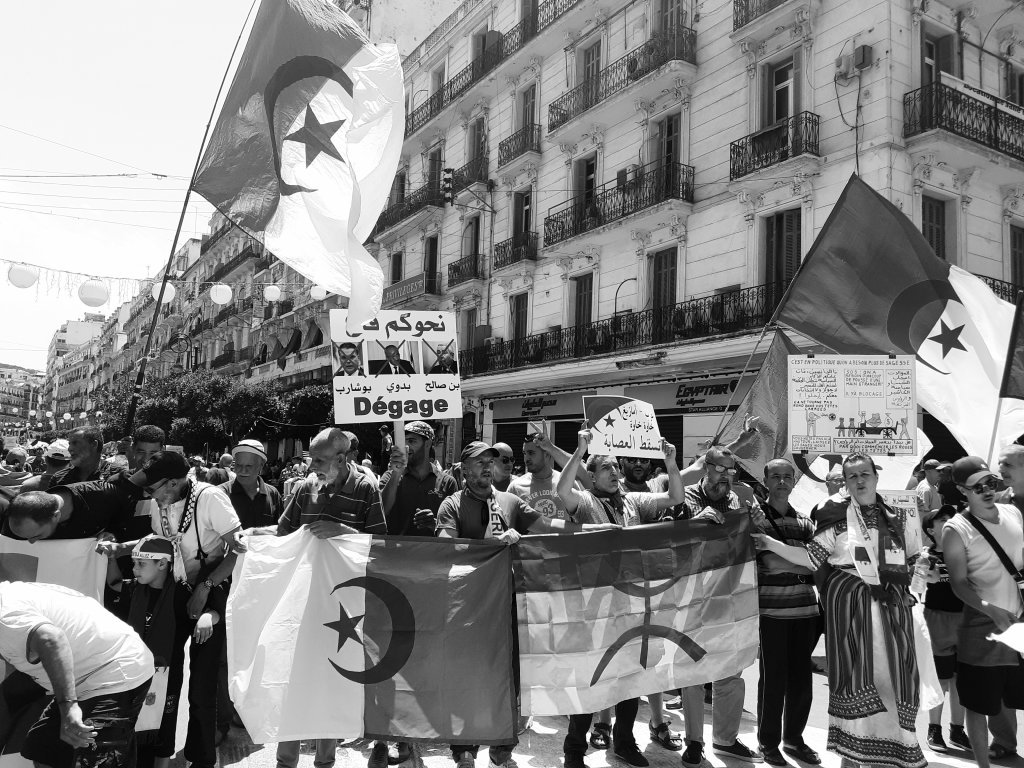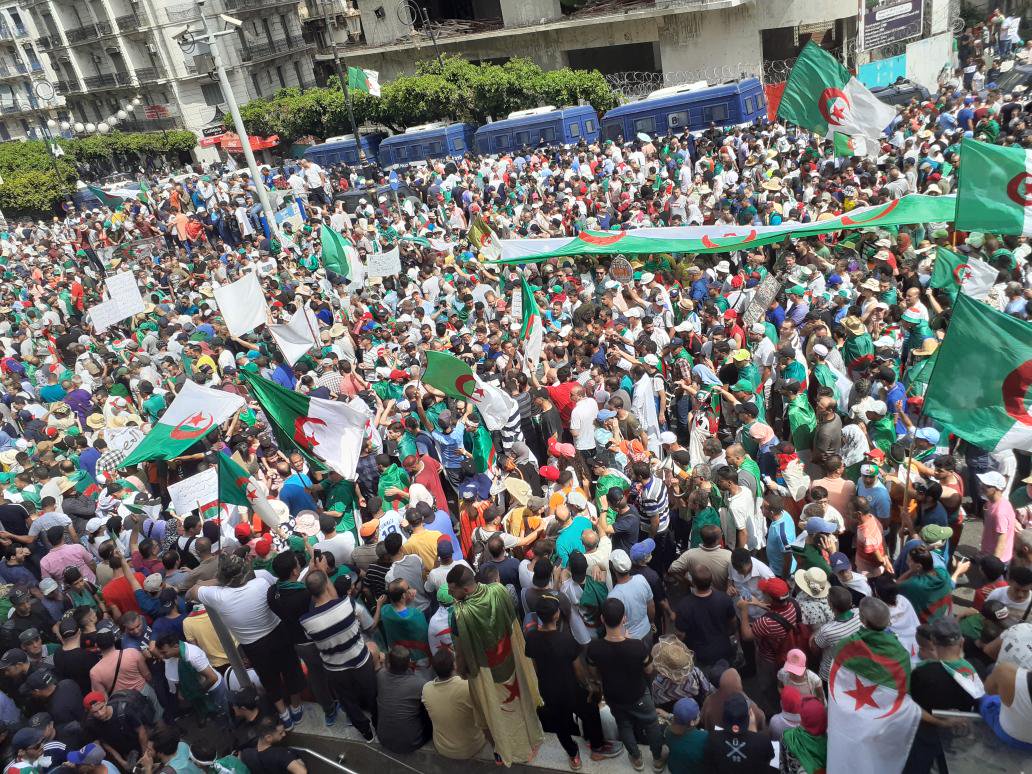
Anti-government protesters gathered in the capital Algiers on July 6, 2019 to mark the 57th anniversary of Algeria's independence. Photo by the author and used with permission.
Since February 22, Algerians have been taking to the streets in the country’s different wilayas (provinces), to protest against corruption, unemployment and the country’s political elite. The popular movement, “Hirak”, started when ageing president Abdelaziz Bouteflika announced his bid for a fifth term in office. Bouteflika later dropped his plan to run again for president, and after 20 years in power, resigned on April 3.
However, Algerians have continued to protest against what they describe as remnants of the Bouteflika regime who are still in power and also against a government decision to go ahead with the presidential election scheduled for December 12. Protesters fear that the poll will be rigged, and many consider it a ploy designed to keep the old regime in power. The five candidates standing in the election are either former members or supporters of Bouteflika's administration.
Who are the contenders in Algeria’s presidential election?
The five contenders in the presidential race are former prime ministers Ali Benflis and Abdelmadjid Tebboune, former culture minister Azzedddine Mihoubi, former tourism minister Abdelkader Bengrine, and Abdelaziz Belaid, head of the El Mostakbal Movement party.
While campaigning across the country, some candidates have been chased out of certain districts. Some protesters who have interrupted campaign events have been arrested and sentenced, stirring further anger and criticism.
On November 30 Algeria also witnessed pro-election demonstrations which were much smaller than the weekly Friday protests rejecting the elections.
The protests in Algeria have brought the country back into the spotlight after decades of international media isolation. This is not the first time massive protests have engulfed Algeria—this happened as well during the 1988 black October riots and the civil war that started in 1992. But this time the protests have been live-tweeted, YouTubed and live-streamed on Facebook by tech-savvy social media users.
The country’s lack of a robust media landscape has driven protesters and activists to break through the wall of fear and use social media platforms to broadcast live reports on what’s happening in the streets. Amateur footage of the protests is being widely circulated on Twitter, Facebook and Instagram, as well as broadcast by foreign media outlets.
The independent media sector in Algeria is not well developed; the few independent media outlets that do exist are subject to severe restrictions from the Algerian authorities. Traditional outlets are considered government mouthpieces, unable to cope with the ongoing transformation of the Algerian society. Protesters have expressed their lack of trust in the majority of media outlets with slogans such as “Where is the press?” ( وين راهي الصحافة؟ ).
The authorities have responded to this upsurge in the use of social media to report on what's happening on the ground by disrupting access to networks and social media platforms.
Old habits die hard

Anti-government protesters in the capital Algiers on July 6, 2019. Photo taken by the author and used with permission.
Social media platforms are not banned in Algeria, and this helped to spread word of the protests quickly, despite the slowness of the country's internet. However, Algeria has a poor record on press freedom, ranking 141 in this year's World Press Freedom Index.
The country has also blocked access to the internet over the last couple of years in an ineffective attempt to prevent cheating during the national baccalaureate exam.
Yes despite the documented cases of arrests and lawsuits targeting independent journalists and bloggers, the media crackdown in Algeria has long been overshadowed by the activities of other authoritarian regimes in the region, such as Egypt.
Since the start of the Hirak, the crackdown on media and internet freedoms intensified. On February 22, the government imposed regional internet blackouts that affected several regions in and around Algiers, including Bordj Menaiel, Tizi Ouzou, and east of Chlef. The blackouts and internet disruptions continued until the second week of the protests on March 2.
On June 12, independent news websites Tout sur l’Algérie (TSA) and Algérie Part were rendered inaccessible for a couple of days, in what TSA’s director described as a ‘’deliberate act of censorship.’’ Neither the authorities nor the Internet Service Providers (ISPs) provided an explanation. Unlike state media, which has larged ignored the national uprising, both TSA and Algérie Part, along with other independant websites, have been providing extensive coverage of the weekly protests.
There have also been attempts to suppress the nationwide anti-Bouteflika marches in the name of ‘’public order’’ and ‘’protecting national security.’’
Despite the internet disruptions and the crackdowns, however, the protest movement continued to grow, culminating in Bouteflika’s removal from office in April. But as the protests against Algeria’s political elite have continued, so have the disruptions to the internet.
On June 16 and 17, social media services and messaging apps, including Facebook, Twitter, Instagram, WhatsApp, Skype and Viber, were blocked. The disruptions also coincided with the national baccalaureate exams.
On August 9, state-owned Algerie Telecom and other ISPs blocked access to Youtube, Google Translate and other Google services for a few hours after a former defence minister published a video calling on army leaders to ‘’realize the demands of the people.’’
On September 14 and 15, Netblocks also documented internet blackouts in several regions across the country, including parts of the capital Algiers.
⚠️ Alert: Internet shutdowns registered across #Algeria amid widening protests against military influence; network data show disruptions consistent with those used during Bouteflika regime; incident ongoing #Algérie #TiziOuzou #Bouïra #Sétif #Jijel ?
? https://t.co/Lx7XjlA6qP pic.twitter.com/eeCiOp0nsI
— NetBlocks.org (@netblocks) September 14, 2019
For more than 42 weeks, Algerians have been taking to the streets to demand the removal of the ruling elite, an end to corruption and to the military’s influence in politics. Tensions are running high as the December 12 presidential election approaches, and with the advent, in recent days, of street demonstrations by pro-government supporters. Will the authorities once again resort to disrupting access to the internet as polling day nears? Algeria’s internet freedom record suggests that this is not unlikely in the least.
This article is part of a series of posts examining interference with digital rights through methods such as internet shutdowns and disinformation during key political events in seven African countries: Algeria, Ethiopia, Mozambique, Nigeria, Tunisia, Uganda, and Zimbabwe. The project is funded by the Africa Digital Rights Fund of The Collaboration on International ICT Policy for East and Southern Africa (CIPESA).







